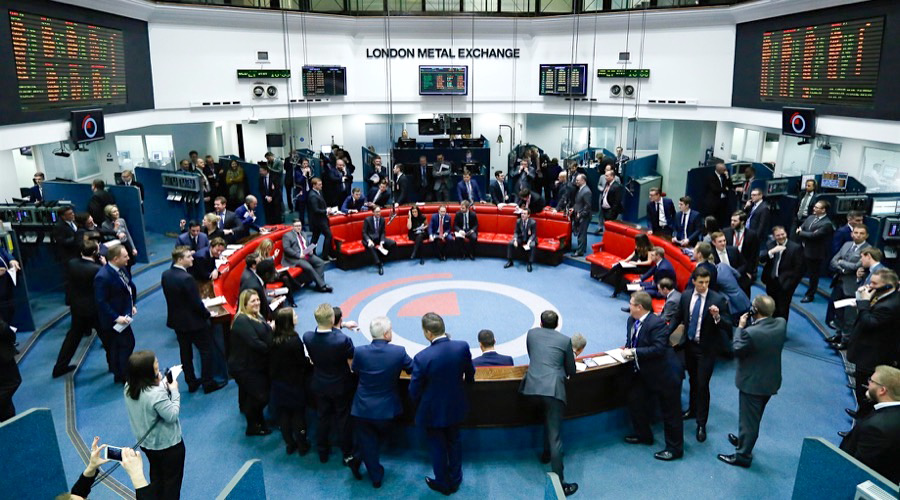Fate of London metals pit hangs in balance after trader pushback

When the London Metal Exchange in January proposed closing its historic trading floor, many in the industry assumed it was a done deal. But after a backlash from major users, it’s looking a lot less certain.
After months of consultations, the LME’s board will meet Thursday to decide the future of the open-outcry floor. One of the last of its kind in the world, “the Ring” was closed temporarily last March as the U.K. went into lockdown. Ever since, global prices for copper and other industrial metals have been set electronically — and so smoothly that the LME argued there was no need to reopen the floor at all.
Instead of quiet acceptance, the proposal kicked off an energetic offensive to save the Ring, led by the floor traders who have the most to lose. Armed with data pointing to shortcomings in the electronic-pricing system, they’ve waged a lobbying campaign in the U.K. press and enlisted their own clients to the cause, in some cases providing templates for letters to the LME, according to people familiar with the matter.
It’s not just the Ring brokers — there’s been opposition from some major traders and consumer groups too. The LME has received more than 190 responses to its January proposals, according to people familiar with the matter who asked not to be identified discussing private information. About half of the respondents wanted the Ring to stay open, when the responses are weighted according to trading volumes, they said.
While the LME says permanently closing the Ring could increase transparency and boost volumes, critics of the plan insist the pricing process has become less efficient.
The market’s input is important because the LME has a tradition of consultation on major reforms due to its long history as a member-owned institution
“I presume they’ve received a lot more pushback than they anticipated,” Kevin Tuohy, co-head of metals at ring-dealing brokerage StoneX Group, said in an interview. “We’ve been very candid with the LME, in saying that we don’t think this is the right time to be making these big structural changes.”
“All feedback received in response to our discussion paper is confidential and will be considered in detail by the LME boards,” a spokesperson for the LME said. “Any decisions reached will be announced in due course.”
The market’s input is important because the LME has a tradition of consultation on major reforms due to its long history as a member-owned institution. That’s continued even after the bourse was acquired in 2012 by Hong Kong Exchanges and Clearing Ltd.
In addition to the future of the Ring, the directors are due to discuss several other proposals from the LME, including changes to the way that clearing margins are calculated, which have met with heavy opposition.
The wave of criticism means the board could choose a compromise position, either on the Ring — perhaps allowing it to re-open for a transition period before final closure — or on other parts of the proposals.
Beyond the floor dealers, critics of the plan to close the Ring include Chinese miner and trader China Minmetals Corp., a group of German metals traders, and the International Wrought Copper Council, which represents more than 150 companies that together use more than half of all the copper produced globally.
Glencore Plc has also expressed support for the Ring, according to people familiar with the matter. The world’s largest metals trader argued that the LME should ensure that the liquidity and price discovery available on the Ring can be replicated before switching to a fully electronic trading process, one of the people said.
On the other side of the debate, the proposal has been welcomed by some high-frequency traders, who say the Ring’s closure is long past due. Other commodities exchanges including the International Petroleum Exchange and CME Group’s New York Mercantile Exchange closed their trading pits and successfully migrated over to electronic pricing systems years ago.
“Metals trading needs to come into the 21st century,” Syed Ahsan Ansar, a quantitative trader at Jump Trading LLC, said in a LinkedIn post. “Keeping the Ring alive simply does not reflect our times.”
Behind the scenes, there is also a less-vocal collection of banks, hedge funds, physical traders and asset managers that will play an influential role in the debate but have kept their views private.
“What we’ve told the LME is that the mechanism works,” said Simon Van Den Born, president of leading Ring-dealing brokerage Marex. “That’s what the majority of clients have told us when we’ve asked them.”
(By Mark Burton and Jack Farchy)
{{ commodity.name }}
{{ post.title }}
{{ post.date }}




Comments